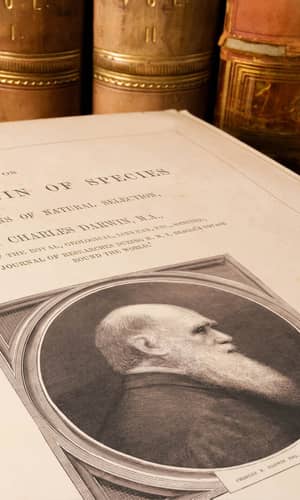Professional, peer-reviewed papers discussing the origin of species from a biblical worldview and a young earth
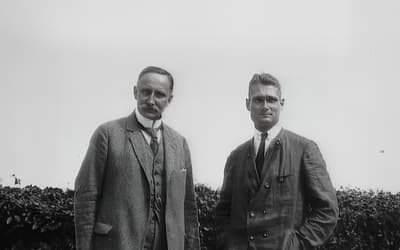
Karl Haushofer: One of the More Important Persons to Influence the Events That Led to WWII and the Holocaust
Dr. Jerry Bergman • Nov. 1, 2023
Hitler was following the teachings of his mentor, Karl Ernst Haushofer, and Haushofer’s disciples, including Rudolf Hess and a few other academics and scholars.

The Central Role of Darwinism in the Vietnam War
Dr. Jerry Bergman • March 1, 2023
Charles Darwin’s (1809–1882) ideas helped to guide Social Darwinism, which was an underpinning of the Communist and the National Socialist (Nazi) ideologies.
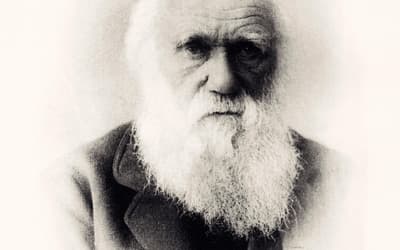
Friedrich Engels Introduced Darwin to Karl Marx and Changed the World
Dr. Jerry Bergman • Nov. 10, 2021
Friedrich Engels was in some ways as important as Marx in helping to establish the revolution called Marxism (Communism) that has changed the world.

Gypsies Massacred as Part of the Darwinian Eugenic Holocaust
Dr. Jerry Bergman • Dec. 9, 2020
Attempts to apply Darwinian eugenics were part of the Nazi effort to produce a superior race in Germany.

Inerrancy and Biblical Authority: How and Why Old-Earth Inerrantists Are Unintentionally Undermining Inerrancy
Dr. Terry Mortenson • Sept. 16, 2020
The old-earth signers of the CSBInerrancy unintentionally violated their own principles of interpretation and unintentionally undermined the inerrancy and the authority of Scripture.
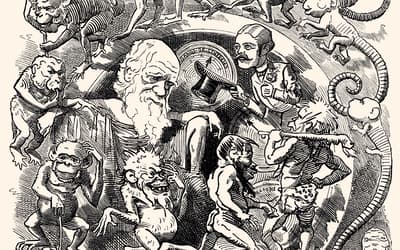
Response to “Still No Replacement of Darwin: A Reply to Nathaniel Jeanson’s Response to My Review of Replacing Darwin—The New Origin of Species”
Dr. Nathaniel T. Jeanson • Nov. 21, 2018
Frello’s recent critique is helpful progress in our discussion, and it argues for the strength of the science in Replacing Darwin.

Still No Replacement of Darwin—A Reply to Nathanial Jeanson’s Response to my Review of Replacing Darwin—The New Origin of Species
Stefan Frello • Nov. 21, 2018
I used to think that when creationists talk about creation and evolution as a clash between worldviews, they were wrong. Jeanson has helped me change my mind.
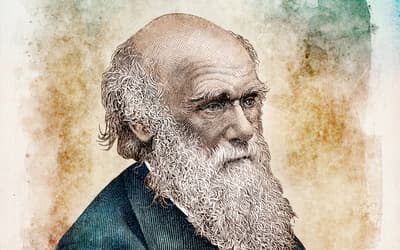
Response to “No Replacement of Darwin: A Review of Replacing Darwin—The New Origin of Species”
Dr. Nathaniel T. Jeanson • April 25, 2018
Ironically, Frello has actually done me a great favor; his review ends up bolstering my original claims.

No Replacement of Darwin
Stefan Frello • April 25, 2018
Jeanson takes on a formidable task: To show that the theory of evolution is wrong, and to replace it with biblical creation. To make it short: Jeanson fails.

Big Gaps and Short Bridges: A Model for Solving the Discontinuity Problem
Change Laura Tan • July 6, 2016
This paper argues that the issue with the origin of life and the origin of biodiversity is not an issue of time, though deep time is problematical.
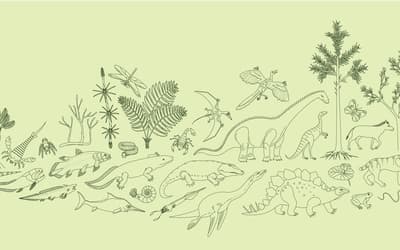
On the Origin of Eukaryotic Species’ Genotypic and Phenotypic Diversity
Dr. Nathaniel T. Jeanson , et. al. • April 20, 2016
This study shows that created heterozygosity, together with natural processes that are observable, is sufficient to account for species’ diversity.
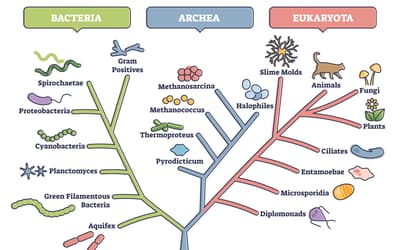
Using Taxonomically Restricted Essential Genes to Determine Whether Two Organisms Can Belong to the Same Family Tree
Change Laura Tan • Nov. 4, 2015
How are all life forms connected? Are they linked by one giant family tree, a web, or a forest of family trees?

Documented Anomaly in Recent Versions of the BLASTN Algorithm and a Complete Reanalysis of Chimpanzee and Human Genome-Wide DNA Similarity Using Nucmer and LASTZ
Jeffrey P. Tomkins • Oct. 7, 2015
Past evolutionary research in comparative DNA analysis between chimps and humans has employed a great deal of preferential and selective data analysis.

Mitochondrial DNA Clocks Imply Linear Speciation Rates Within “Kinds”
Dr. Nathaniel T. Jeanson • June 3, 2015
The mechanism of speciation remains one of the most contested scientific questions among both evolutionists and creationists.

Information Processing Differences Between Bacteria and Eukarya—Implications for the Myth of Eukaryogenesis
Change Laura Tan , et. al. • March 25, 2015
Based on differences in gene sets and molecular machines between bacteria and eukarya, we continue to demonstrate that unbridgeable evolutionary chasms exist.

Information Processing Differences Between Archaea and Eukarya—Implications for Homologs and the Myth of Eukaryogenesis
Change Laura Tan , et. al. • March 18, 2015
In the grand evolutionary paradigm, the origin of the eukaryotic cell represents one of the great mysteries and key hypothetical transitions of life.

Natural Selection: Assessing the Role It Plays in our World
Dr. Jean Lightner • March 4, 2015
Natural selection is controversial among many scientists, both in evolutionary and creationary circles.
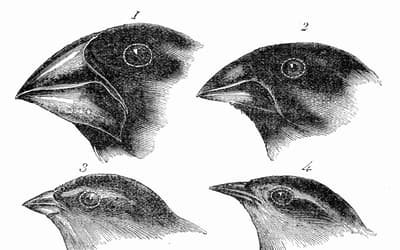
A Response to “Does Natural Selection Exist?”: Creatures’ Adaptation Explained by the Design-based, Organism-driven Approach: Part 3
Randy J. Guliuzza • Nov. 5, 2014
This third installment is a continuation of my response to a recent critical paper (Jeanson 2013).

Reply to “A Response to ‘Does Natural Selection Exist?’”
Dr. Nathaniel T. Jeanson • Nov. 5, 2014
In this three-part ~35,000-word response, Guliuzza (2014a, b, c) fails to clearly define his terms and/or use them consistently.

A Response to “Does Natural Selection Exist?”: Creatures’ Adaptation Explained by the Design-based, Organism-Driven Approach: Part 1
Randy J. Guliuzza • Oct. 29, 2014
This paper responds to a 2013 Jeanson paper critical of a series of Acts & Facts articles published by the Institute for Creation Research (ICR).

A Response to “Does Natural Selection Exist?”: Creatures’ Adaptation Explained by the Design-based, Organism-driven Approach: Part 2
Randy J. Guliuzza • Oct. 29, 2014
This second installment is a continuation of my response to a recent critical paper (Jeanson 2013) on a series of Acts & Facts articles.

Scientific Evidence Indicates Natural Selection and Brain-Based Education Conflict with Human Nature
Callie Joubert • Oct. 15, 2014
Children have an innate, natural, intuitive, and unlearned tendency to reason about the world as biblical creationists do.

Old Earth Theology: A Factor that Explains Inconsistent Belief of Inerrancy Among Florida Southern Baptists
David Mcgee • Oct. 1, 2014
A major shift in thinking seems to be occurring in contemporary evangelical thinking.
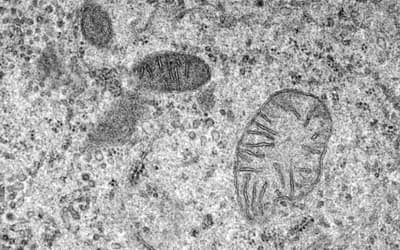
Recent, Functionally Diverse Origin for Mitochondrial Genes from ~2700 Metazoan Species
Dr. Nathaniel T. Jeanson • Dec. 11, 2013
The young-earth creation model currently lacks a robust explanation for molecular diversity.
Origin of Species on Answers Research Journal
How did the rich diversity of life on earth arise? What is the origin of the millions of species on our planet? Charles Darwin proposed that all life arose via natural processes from one or a few common ancestors over millions of years. Darwin’s chief mechanism was natural selection. Now, a century-and-a-half later, the modern evolutionary synthesis proposes genetic mutations in concert with natural selection as the primary driving force of evolution.
The Bible describes a very different history for species. The original text of Scripture does not use the modern term species. Instead, it speaks of kinds that God created around 6,000 years ago and which Noah took on board the Ark around 4,500 years ago. The taxonomic level equivalent to kind is still debated among creationists. Breeding studies have suggested the classification level of family as the best current approximation. This implies that new species have formed within kinds. It also suggests hard limits to biological change—a model summarized by the phrase limited common ancestry.
Current creationist research seeks to further uncover the kind boundaries. It also seeks the mechanisms by which species have formed within kinds and, conversely, the biological mechanisms limiting the speciation process. In addition, current research seeks to uncover the timeline of the speciation process. As a complement to these pursuits, creationist research also welcomes scholarly critiques of the modern evolutionary model.
Several other corollary pursuits follow from these big-picture goals. Scripture implies that all land-dependent, air-breathing kinds left the Ark and migrated to their current locations. The field of biogeography seeks to understand the timing and spread of species around the globe. Current creationist research does as well.
Scripture also implies that animal death and natural evil did not exist before Adam and Eve sinned. This raises the question of the origin of pathogens, of predator-prey relationships, of natural defenses such as the immune system, of defense mechanisms such as camouflage, and the like. Creation research pursues answers to these questions.
Finally, the Bible details an extensive anthropology. God created the first humans, Adam and Eve, about 6,000 years ago. They are the ancestors of everyone alive today. Eight of their descendants, Noah, his wife, his sons (Shem, Ham, Japheth), and his sons’ wives, were the only human survivors of the global Flood catastrophe. Everyone alive today also traces their ancestry back to this group of people. Creation research seeks to understand the alignment between the genetic history of humanity and biblical anthropology.
The aim of these peer-reviewed papers is to address some aspect of Charles Darwin’s Origin of Species from a biblical creation perspective. Papers may directly interact with Darwin’s book or may consider related aspects of his work.
